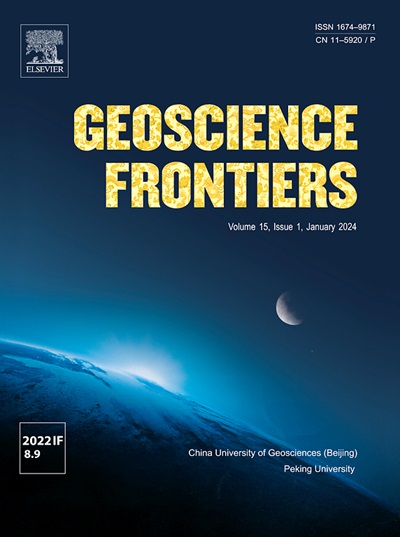The causal links between green energy, uncertainty, remittances, FDI, and ecological footprint: Evidence using structural breaks and multiple wavelet approach
IF 8.9
1区 地球科学
Q1 GEOSCIENCES, MULTIDISCIPLINARY
引用次数: 0
Abstract
Policies encouraging green energy adoption promote environmental sustainability, particularly in developing countries where the remittances boost household consumption. This research aims to empirically examine the impact of green energy, output, uncertainty, remittances, and Foreign Direct Investment (FDI) on the ecological footprint in Ecuador during 1990–2023. The research contributes to the green energy-environmental sustainability nexus debate by capturing the effect of external and internal shocks in the series and assessing the time–frequency dimension. This research is pioneering in examining the causal relationship between green energy, the uncertainty index, and the ecological footprint using combined cointegration and the multiple wavelet approach in the context of a remittance-dependent country. Notably, cointegration techniques with structural breaks, long-run elasticities using Dynamic Ordinary Least Square (DOLS), Fully Modified Ordinary Least Square (FMOLS), and Canonical Cointegrating Regression (CCR) models, partial and multiple wavelet analysis, and Fourier causality are used for estimation purposes. Accordingly, the results confirm cointegrating relationships in the presence of structural breaks among green energy, GDP, uncertainty, remittances, FDI, and environmental sustainability. Besides, it is found that output and uncertainty increase the ecological footprint, while remittances, FDI, and green energy reduce it. Hence, policymakers should consider remittances, FDI, and green energy as mechanisms to achieve Sustainable Development Goals (SDG) agenda so that environmental sustainability can be promoted in Ecuador.

绿色能源、不确定性、汇款、FDI和生态足迹之间的因果关系:基于结构断裂和多小波方法的证据
鼓励采用绿色能源的政策促进了环境的可持续性,特别是在汇款促进家庭消费的发展中国家。本研究旨在实证检验1990-2023年间绿色能源、产出、不确定性、汇款和外国直接投资(FDI)对厄瓜多尔生态足迹的影响。该研究通过捕捉外部和内部冲击的影响以及评估时间-频率维度,为绿色能源-环境可持续性关系的争论做出了贡献。本研究在考察绿色能源、不确定性指数和生态足迹之间的因果关系方面是开创性的,在一个依赖汇款的国家的背景下,采用联合协整和多小波方法。值得注意的是,使用结构断裂的协整技术、使用动态普通最小二乘法(DOLS)、完全修正普通最小二乘法(FMOLS)和典型协整回归(CCR)模型的长期弹性、部分和多重小波分析以及傅立叶因果关系用于估计目的。因此,研究结果证实了绿色能源、GDP、不确定性、汇款、FDI和环境可持续性之间存在结构性断裂的协整关系。此外,研究发现产出和不确定性增加了生态足迹,而汇款、FDI和绿色能源减少了生态足迹。因此,政策制定者应考虑将汇款、外国直接投资和绿色能源作为实现可持续发展目标(SDG)议程的机制,从而促进厄瓜多尔的环境可持续性。
本文章由计算机程序翻译,如有差异,请以英文原文为准。
求助全文
约1分钟内获得全文
求助全文
来源期刊

Geoscience frontiers
Earth and Planetary Sciences-General Earth and Planetary Sciences
CiteScore
17.80
自引率
3.40%
发文量
147
审稿时长
35 days
期刊介绍:
Geoscience Frontiers (GSF) is the Journal of China University of Geosciences (Beijing) and Peking University. It publishes peer-reviewed research articles and reviews in interdisciplinary fields of Earth and Planetary Sciences. GSF covers various research areas including petrology and geochemistry, lithospheric architecture and mantle dynamics, global tectonics, economic geology and fuel exploration, geophysics, stratigraphy and paleontology, environmental and engineering geology, astrogeology, and the nexus of resources-energy-emissions-climate under Sustainable Development Goals. The journal aims to bridge innovative, provocative, and challenging concepts and models in these fields, providing insights on correlations and evolution.
 求助内容:
求助内容: 应助结果提醒方式:
应助结果提醒方式:


